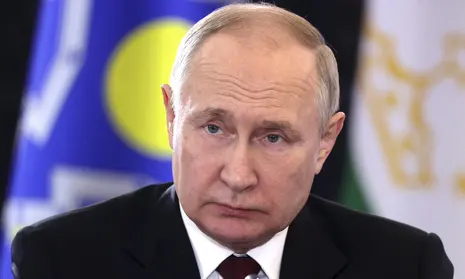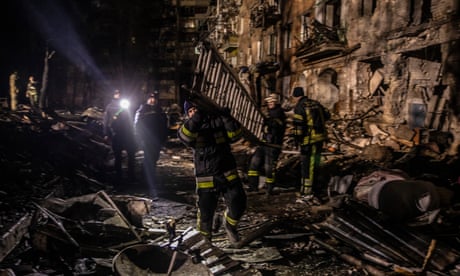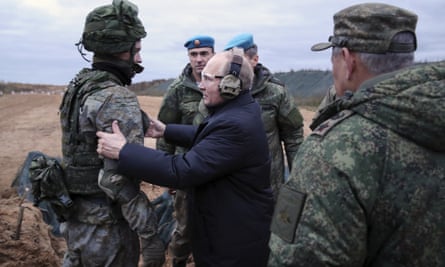
President derided for ‘staging’ meeting with handpicked mothers and wives in attempt to quell anger over call-up
Two months after mobilising tens of thousands of Russian men, the Kremlin has said that Vladimir Putin will grant some of their mothers and wives an audience to quell fears over the mass call-up.
But advocates for soldiers’ families have said they were passed over for the meeting and are expecting it to be a whitewash covering up the Kremlin’s disregard for its own soldiers fighting in Ukraine.
Valentina Melnikova, a veteran advocate for soldiers’ families going back to 1989, said in an interview with the Guardian that she had not been approached about the meeting with Putin, which is expected to take place later this week.
“Of course they didn’t invite us and we of course don’t want to go,” she said.
She said it would be one thing to go alone and meet the Russian president as representative of the Soldiers’ Mothers Committee, which she says has received thousands of complaints, more than in the years of the Russian war in Chechnya.
But she said that, like other rights activists who have not been chosen to take part in the meeting, she believed the Kremlin would handpick its representatives or perhaps even fill out their ranks with planted audience members, in order to stage Putin’s meeting with the “public”.
“To go together with the relatives of mobilised [soldiers] who are agreed to their husbands and sons dying on the front is not comfortable for us. We have somewhat different interests and different problems.”
She declined to elaborate because of the dangers for activists discussing what Russia has called its “special military operation”. There is no mainstream anti-war movement in Russia, in part owing to restrictive laws that punish dissent on the internet and in public rallies.
But one key source of criticism comes from the families of Russian soldiers, who have been mobilised under questionable pretences, poorly trained, ill-equipped and often thrown into battles that have resulted in high numbers of casualties. Dozens of Russians have also complained of corruption, abuse and illegal detention in the army, and their families have sometimes gone public in video addresses made directly to Putin, asking him to intervene.

“This is a very difficult time,” said Melnikova. “We’ve never had thousands of appeals in a week.” At times, she said, mobilisation appeared to be “total lawlessness”.
“People are expected to fend for themselves,” she said.
Other activists have directly called out the Russian president for “hiding” from his critics.
“Vladimir Vladimirovich [Putin], are you a man or what?” said Olga Tsukanova, a co-head of the Council of Mothers and Wives, activists who have petitioned the government to halt mobilisation and return men from the front. “Do you have the courage to look us in the eye, not with hand-picked women and mothers in your pocket, but with real [women], who have travelled from various cities here to meet with you?”
“We are waiting for your answer! Or will you hide again?” added Tsukanova, whose 20-year-old son was drafted and has resisted being sent to Ukraine. Tsukanova was speaking in a video blog that was quickly picked up by the independent Russian press.
On Wednesday, the organisation held a roundtable meeting with women complaining about the army’s actions. Before the event, they claimed that they were being followed by members of the Russian security forces.

At the event, they propped up large photographs of Russian officials who had been invited to take part but had ignored the meeting, including the defence minister, Sergei Shoigu, and chief of the general staff, Valery Gerasimov.
One woman from Russia’s far east, Marina Borisovna, said by video call that two of her sons had been mobilised. One had two young children, she said. “Who is going to raise my grandchildren? … I ask all those from whom it depends to please return my son so that he can raise his two little daughters.” Other women complained that their husbands had been sent to fight with no training.
Putin’s meeting with the families of soldiers, which was confirmed by the Kremlin this week, is seen as an effort to protect the image of the Russian president who at times has been accused of being out of touch and ridiculed as living “in a bunker”.
“Mobilisation has been an enormous stress for all of [Russian] society,” said Denis Volkov, the director of the Levada Center, an independent polling agency in Moscow.
Citing recent polls, he added: “Assessments of wellbeing have sharply decreased. There hasn’t been such a sharp drop in the history of observation, and support for this decision [on mobilisation] has been far lower than support for the special military operation in general.
“I think that they couldn’t ignore that,” he added. Putin’s meeting with the mothers would serve to show “that Putin knows about it, that he’s involved”.
Melnikova said an audience with the mothers and families of mobilised soldiers who have gone public with their demands could lead to embarrassment for Putin.
She recalled his meeting in 2000 with the relatives of dead sailors on the Kursk nuclear submarine, which ended with Putin being heckled in public.
“It was a real scandal. That was a meeting. I think since then he hasn’t met with the real relatives [of soldiers],” she said. “He doesn’t want to hear the truth. And he can’t control himself.
“All that’s changed is that someone in the presidential administration has realised that they need a response to these demands,” she said, adding that the administration fears these demands growing into open opposition.




